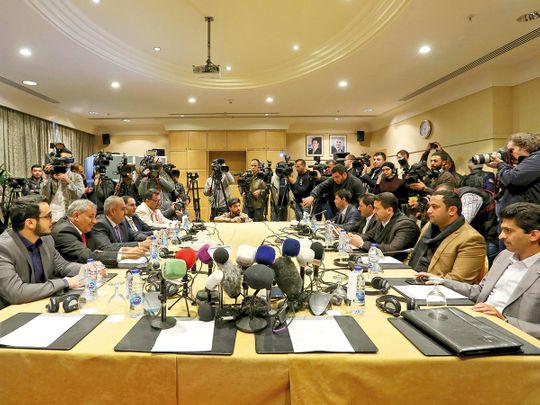
GENEVA: Representatives of Yemen’s government and Iran-backed Houthi rebels kicked off talks in Geneva on Saturday on an exchange of prisoners, with the United Nations calling on both sides to engage in “serious” discussions.
The new round of closed-door negotiations amid years of civil war are being overseen by the UN and the International Committee of the Red Cross.
“I hope the parties are ready to engage in serious and forthcoming discussions to agree on releasing as many detainees as possible,” UN special envoy for Yemen Hans Grundberg said in a statement.
The talks, reportedly set to last 11 days, mark the seventh meeting aimed at implementing an agreement on prisoner exchanges reached in Stockholm five years ago, the UN said.
Under that deal, the sides agreed “to release all prisoners, detainees, missing persons, arbitrarily detained and forcibly disappeared persons, and those under house arrest”, held in connection with Yemen’s nearly decade-long conflict, “without any exceptions or conditions”.
The ICRC noted in a statement to AFP that past meetings mediated by Grundberg’s office had “resulted in the release of prisoners on both sides”,
1,050 detainees
“In 2020, more than 1,050 detainees were released and provided with transportation to their region of origin or home country following an agreement reached by the sides,” it said.
The latest meeting comes almost a year after the Huthis said they had agreed to a prisoner swap that would see 1,400 rebels freed in exchange for 823 pro-government fighters - including 16 Saudis and three Sudanese nationals.
But the warring parties have since held a series of talks in the Jordanian capital Amman that did not result in any developments.
Grundberg emphasised the urgency of reaching an agreement.
“With Ramadan approaching, I urge the parties to fulfil the commitments they made, not just to each other, but also to the thousands of Yemeni families who have been waiting to be reunited with their loved ones for far too long,” he said.
The Huthi rebels took control of the Yemeni capital Sanaa in 2014, prompting a Saudi-led coalition to intervene on behalf of the Yemeni government the following year.
Since then, a grinding war has killed hundreds of thousands and pushed the impoverished nation to the brink of famine.
Fighting has largely been on hold since a UN-brokered ceasefire took effect in April last year, even after the agreement expired in October.












